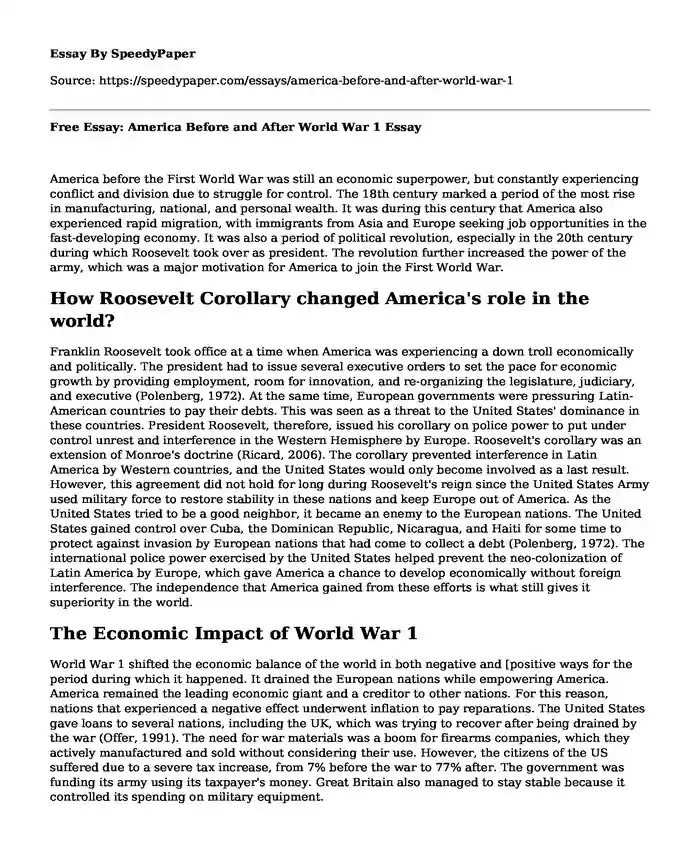
| Type of paper: | Essay |
| Categories: | World War 1 American history |
| Pages: | 3 |
| Wordcount: | 755 words |
America before the First World War was still an economic superpower, but constantly experiencing conflict and division due to struggle for control. The 18th century marked a period of the most rise in manufacturing, national, and personal wealth. It was during this century that America also experienced rapid migration, with immigrants from Asia and Europe seeking job opportunities in the fast-developing economy. It was also a period of political revolution, especially in the 20th century during which Roosevelt took over as president. The revolution further increased the power of the army, which was a major motivation for America to join the First World War.
How Roosevelt Corollary changed America's role in the world?
Franklin Roosevelt took office at a time when America was experiencing a down troll economically and politically. The president had to issue several executive orders to set the pace for economic growth by providing employment, room for innovation, and re-organizing the legislature, judiciary, and executive (Polenberg, 1972). At the same time, European governments were pressuring Latin- American countries to pay their debts. This was seen as a threat to the United States' dominance in these countries. President Roosevelt, therefore, issued his corollary on police power to put under control unrest and interference in the Western Hemisphere by Europe. Roosevelt's corollary was an extension of Monroe's doctrine (Ricard, 2006). The corollary prevented interference in Latin America by Western countries, and the United States would only become involved as a last result. However, this agreement did not hold for long during Roosevelt's reign since the United States Army used military force to restore stability in these nations and keep Europe out of America. As the United States tried to be a good neighbor, it became an enemy to the European nations. The United States gained control over Cuba, the Dominican Republic, Nicaragua, and Haiti for some time to protect against invasion by European nations that had come to collect a debt (Polenberg, 1972). The international police power exercised by the United States helped prevent the neo-colonization of Latin America by Europe, which gave America a chance to develop economically without foreign interference. The independence that America gained from these efforts is what still gives it superiority in the world.
The Economic Impact of World War 1
World War 1 shifted the economic balance of the world in both negative and [positive ways for the period during which it happened. It drained the European nations while empowering America. America remained the leading economic giant and a creditor to other nations. For this reason, nations that experienced a negative effect underwent inflation to pay reparations. The United States gave loans to several nations, including the UK, which was trying to recover after being drained by the war (Offer, 1991). The need for war materials was a boom for firearms companies, which they actively manufactured and sold without considering their use. However, the citizens of the US suffered due to a severe tax increase, from 7% before the war to 77% after. The government was funding its army using its taxpayer's money. Great Britain also managed to stay stable because it controlled its spending on military equipment.
How Domestic and International Figures Played Key Roles in the War
The First World War was motivated by individualism and a struggle to prove superiority among nations, at the expense of poor citizens and soldiers who has no clue for what reason they were on the battlefield. Most of the MPs in Congress in the United States and government officials had shares in the firearm manufacturing companies, thus had stakes in the war (Canfield, 2000). It did not matter how many people were killed, but how much profit they were earning. The desire among Heads of State to be the most powerful was also fuel for the war. International treaties formed between nations determined the strength of the joint army, which either motivated or demoralized the soldiers. Two joint armies, the central powers against the Alien powers, were formed out of international influence from the States' presidents and prime ministers.
Conclusion
The First World War cost lives, brought the world economy to its knees, and benefitted only a few individuals. Although before the conflict America built economic superiority, there are no positive impacts of this war that can be pointed out today.
References
Canfield, B. N. (2000). US Infantry Weapons of the First World War. Andrew Mowbray Publishers.
Offer, A. (1991). The first world war: an agrarian interpretation. OUP Catalogue.
Polenberg, R. (1972). War and society: the United States, 1941-1945 (p. 148). Philadelphia: Lippincott.
Ricard, S. (2006). The Roosevelt Corollary. Presidential Studies Quarterly, 36 (1), 17-26.
Cite this page
Free Essay: America Before and After World War 1. (2023, Jan 19). Retrieved from https://speedypaper.com/essays/america-before-and-after-world-war-1
Request Removal
If you are the original author of this essay and no longer wish to have it published on the SpeedyPaper website, please click below to request its removal:
- Free Essay for Everyone on Community Planning
- Free Essay on How to Make Electricity
- Essay Example on Five-year Career Goals
- The Impact of Expanded Microteaching on the Teaching Anxiety - Free Essay with the Article Review
- Inbound Marketing Essay, Free Sample for Students in Need
- Free Paper: Individual Research Project on Emaar Properties
- Essay Sample on Climate-Related Issues
Popular categories




